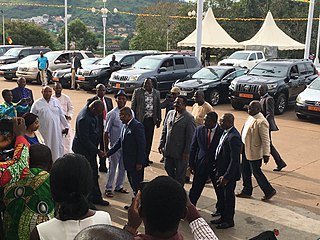
Ni John Fru Ndi was a Cameroonian politician who served as first and founding Chairman of the Social Democratic Front (SDF), the main opposition party in Cameroon, from party foundation in 1990 to his death in 2023. He failed to be elected as a senator in 2013.

The Anglophone problem is a socio-political issue in the modern Republic of Cameroon, rooted in the country's German, British, and French colonial legacies. Anglophone (English-speaking) Cameroonians form a minority population of around 16 percent, mainly from the Northwest and Southwest regions that formerly constituted the Southern Cameroons, part of the former British Cameroon colonies. These Anglophone regions were formerly controlled by Britain as a mandate of the League of Nations, and then as a United Nations trust territory. During the Foumban Conference of 1961, territories with different colonial legacies were finally united into one state.
Wirba Joseph Mbiydzenyuy, is a Cameroonian politician, humanitarian and social activist.

The 2016–2017 Cameroonian protests were a series of protests that occurred following the appointment of Francophone judges in English-speaking areas of the Republic of Cameroon. In October 2016, protests began in two primarily English-speaking regions: the Northwest Region and the Southwest Region.

The Anglophone Crisis, also known as the Ambazonia War, is an ongoing armed conflict in the English-speaking Northwest and Southwest regions of Cameroon, between the Cameroonian government and Ambazonian separatist groups, part of the long-standing Anglophone problem. Following the suppression of 2016–17 protests by Cameroonian authorities, separatists in the Anglophone regions launched a guerrilla campaign and later proclaimed independence. Within two months, the government of Cameroon declared war on the separatists and sent its army into the Anglophone regions.
The Ambazonia Defence Forces (ADF) are a military organization that fights for the independence of Ambazonia, a self-declared independent state in the Anglophone regions of the former Southern Cameroons, Cameroon. It was formally established by the Ambazonia Governing Council (AGovC) on 9 September 2017, the same day as the organization declared a war of independence.
Sisiku Julius Ayuk Tabe is an Ambazonian separatist leader from Ewelle village in Manyu division, and is the disputed first president of the unrecognized Federal Republic of Ambazonia. In January 2018 he was extradited from Nigeria to Cameroon, where he has been incarcerated ever since.
This is a timeline of the Anglophone Crisis during 2018.
This is a timeline of the Anglophone Crisis during 2019.

From 2018, the Anglophone Crisis drew increasing international attention, and became a challenge to Cameroon's foreign relations. Triggered by a violent crackdown on the 2016–2017 Cameroonian protests, the conflict escalated from a low-scale insurgency to a civil war-like situation. While Cameroon enjoys support from African countries, no country has openly supported the Ambazonian independence movements. However, many countries have put pressure on Cameroon to talk to the separatists. In addition, the separatists enjoy support from officers in the Nigerian Army, who have helped arrange arms deals for them.
Seven Karta is an Ambazonian separatist militia that is part of the Ambazonia Self-Defence Council.

The Major National Dialogue is the official name of a dialogue between the Government of Cameroon and various opposition parties, aimed at resolving the Anglophone Crisis. The event took place between September 30 and October 4, 2019.
This is a timeline of the Anglophone Crisis during 2020.

Operation Bamenda Clean is an ongoing Cameroonian special counter-insurgency operation in Bamenda, Northwest Region, aimed at preventing armed Ambazonian separatists from operating in the city. By January 2021, Cameroon was gradually achieving what a security analyst at the University of Yaoundé called "relative peace" in Bamenda, and the mayor of the city stated that the operation was succeeding. However, as of March 2021, separatist-imposed ghost towns remained widely respected by the local population, and separatists controlled most roads leading in and out of Bamenda.
This is a timeline of the Anglophone Crisis during 2021.
This is a timeline of the Anglophone Crisis in Cameroon during 2022.
This is a timeline of the Anglophone Crisis in Cameroon during 2023.
Events in the year 2023 in Cameroon.
This is a timeline of the Anglophone Crisis in Cameroon during 2024.







